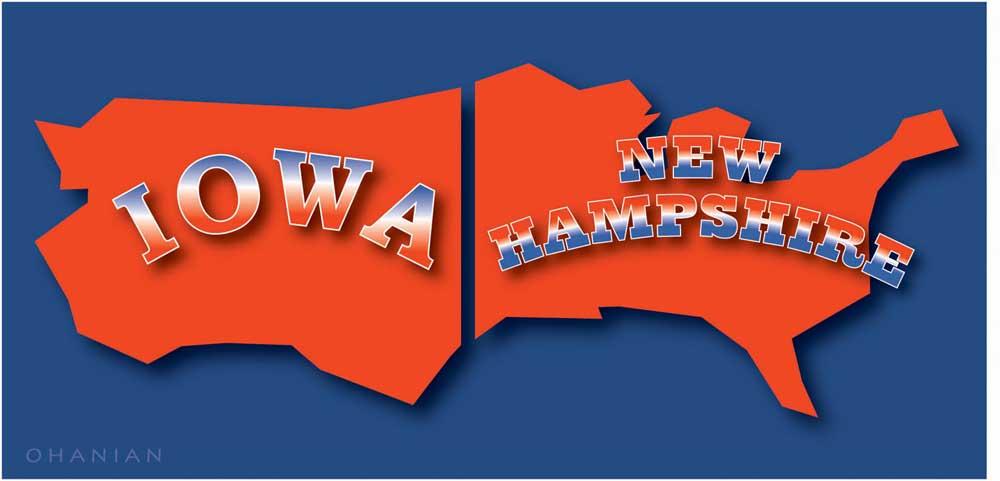Column: Quiz allows voters to see where candidates stand
Published 12:00 am Sunday, November 1, 2015

- This artwork by Nancy Ohanian relates the Iowa caucus and New Hampshire primary.
Are you a Democratic voter who’s torn between Hillary Clinton and Bernie Sanders? Or a Republican deadlocked between Donald Trump and Ben Carson? Do you think Jeb Bush has the right credentials but Carly Fiorina has the chutzpah? Do you have a secret crush on Chris Christie?
Do you know — or care — where Marco Rubio stands on trade, John Kasich on Social Security or Martin O’Malley on tax reform?
If you’re still undecided less than 100 days out from the first presidential party caucuses, there’s something like an app for that, to help you make up your mind.
Caucus and primary candidates as a package offer a tempting buffet of options: You might like this idea from this one and that perspective from someone else. But voters get to order only one dish, and the size of this year’s field makes the options harder than ever to untangle from one another. Even if you’ve read up on each major policy position, caught the candidates at public events and sat through debates, as many of us have, you could get stuck trying to prioritize their rhetoric against your own agenda. But there’s a way to do it scientifically. It’s a free online survey that can show you how each of the candidates measures up to your priorities, as reflected in your answers on current events and various issues including the economy, health care, the environment and foreign policy. Think of it as a matchmaking service for voters and presidential candidates.
The site, www.isidewith.com/elections/2016-presidential-quiz, researches news reports, campaign finance data and candidates’ voting records to see where candidates stand, how committed each has been to a position, where they get their money and more. They then show you who most closely aligns with your views on a range of topics. It will also rate each candidate for you. Last time I looked, more than 22 million people had taken the quiz.
If there’s an issue you’re uncertain about, the quiz offers an explainer. So, for example, a question on hydraulic fracking for oil and natural gas explains the process, and tells you, “While fracking has significantly boosted oil production, there are environmental concerns that the process is contaminating groundwater.” It then links you to recent news reports for further study.
You can opt to give a more nuanced answer to each question, or write in your own. You can also see where the political parties stand on each issue, and where the majority of people surveyed, both in your state and nationally, come down on it. On requiring background checks for gun purchases, 92 percent nationally favored it while 8 percent did not. Among black voters alone, it was 93 percent.
But candidates Cruz, Carson, Rand Paul, Bush, Rubio, Kasich, Lindsay Graham, Fiorina, Rick Santorum and Mike Huckabee disagree, according to the site. Likewise, 81 percent of poll-takers think employers should be required to pay men and women the same salary for the same work. But the site says Cruz, Paul, Bush, Rubio, Graham and Santorum disagree. It was unable to determine the views of Kasich, Carson and Trump.
Of course a survey like this cannot measure intangibles such as personality or charisma, which invariably factor into our impressions of candidates. How well-spoken or outspoken a candidate appears to be, and how close to, or removed from, the political establishment, are also big factors this year.
But this interactive tool tends to democratize the selection process because it focuses not on who’s up or down in the polls but who thinks what. Taking the quiz and thinking through the issues might force us to question our responses to superficial factors, like candidates’ height or dress. Studies have shown, for example, that tall men tend to be elected president the most, which puts the two women in this year’s race at a disadvantage. Also in this crowded field, candidates with lower poll numbers are at a disadvantage because they’re excluded from the main debates. That’s also a disservice to voters.
Elections should be about issues and candidates’ credibility, not about poll numbers, physical appearance or money. Voters can’t rely on political ads slanted to meet some interest group’s agenda to tell the truth. But with tools that make it engaging and easy to make our choices scientifically, there’s really no excuse for voter apathy.
— Rekha Basu is a columnist for the Des Moines Register.






